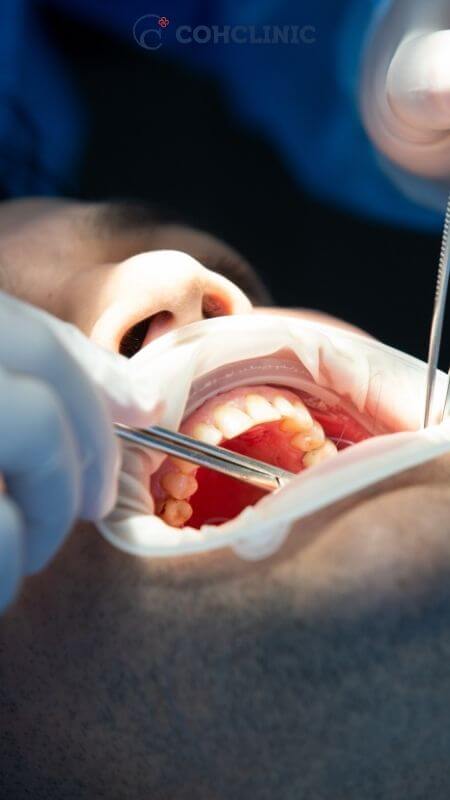A laparoscopic adjustable gastric band (Lap-Band), another name for gastric band surgery, is a surgical treatment intended to help people who are obese lose weight. In this blog, we will focus on lap band surgery, including how to do it, who can benefit from it, and the potential pros and cons.
What is a Gastric Band Surgery?
An adjustable band is wrapped around the top of the stomach during gastric band surgery to form a smaller pouch. This limits how much food the stomach can retain, making it easier to feel full on smaller servings and consuming fewer calories overall. Because the band is customizable, it may be tailored to a person’s needs and rate of weight reduction.
Who is suitable for a Gastric Band?
In general, if you have health problems associated with obesity and have tried and failed with other weight loss methods, you may be a candidate for bariatric surgery.
If you’re searching for a procedure that is less intrusive and more temporary than other weight-loss operations, your healthcare professional can recommend the Lap-Band. Among other bariatric procedures, the gastric band has the lowest risk of post-operative complications since it doesn’t break the stomach or intestines. It can also be taken out if necessary. The lap band, however, results in less weight loss than other bariatric operations.

Additionally, numerous modifications and follow-up doctor visits are needed, especially in the first year. The sleeve gastrectomy and the roux-en-Y gastric bypass are two more bariatric surgical techniques that are currently increasingly popular.
If you have a BMI of 40 or higher, or between 35 and 40 with a medical problem such as high blood pressure or diabetes, gastric band surgery may be a possibility for you.
How does Gastric Band Surgery work?
The procedure is performed laparoscopically, using small incisions and specialized instruments. To divide the top half of the stomach into two halves, a silicone band is wrapped around it during the procedure. Injecting or withdrawing saline solution through a tiny access port that is positioned under the skin enables the band’s tension to be changed. Due to the band’s limitation on food intake and the smaller stomach, weight loss gradually happens.
The Advantages and Disadvantages of Gastric Band

Pros
Unlike other bariatric surgeries, this one does not involve cutting or stapling any of the stomach’s tissue. Thus, nutrients are ingested and absorbed from meals in the same manner as they were before surgery.
Also, among weight loss techniques, it is the safest.
Cons
Frequent band adjustment processes are essential to establish adequate restriction, especially in the early stages after surgery.
Weight loss results are frequently variable compared to more severe weight reduction surgeries, such as the gastric sleeve or bypass. Long-term weight loss following gastric banding is also more challenging than after other weight loss operations.
Significant dietary and eating behavior adjustments are required for safe and efficient weight loss with a gastric band. For example, it is critical to take smaller mouthfuls, chew thoroughly, and eat slowly (to be attentive to what you are eating).
Gastric Band vs. Gastric Balloon
Both treatments function by limiting how much food a person may consume. They rely on a person’s eating habits and are not suitable for everyone. The treatment will be less effective if the additional calories are consumed through liquids or soft foods, as these meals can travel through the band or around the balloon.
Although both operations have an equal chance of success, the gastric balloon is a one-time procedure, whereas the gastric band is a permanent one. Once a gastric balloon has been removed from the stomach, a 5% weight recovery is to be anticipated.
Gastric Band vs. Gastric Bypass
Gastric Band and Gastric Bypass are both surgical weight loss procedures. However, they work in different ways and have distinct features and outcomes. Let’s compare them:
Lap Band
- To create a smaller pouch, the top of the stomach is wrapped with an adjustable band during gastric band surgery. As a result, the amount of food consumed is restricted, resulting in weight loss.
- Within the first two years following gastric band surgery, patients should expect to lose 40–50% of their extra body weight.
- The possibility of the band slipping off, eroding, or contracting an infection might need another surgery. For the best weight loss results, the band may also require adjustments.
Gastric Bypass
- Gastric bypass surgery reduces calorie intake and nutrient absorption by combining restriction (lower stomach size) and malabsorption (bypassing a part of the intestine).
- Compared to gastric band surgery, gastric bypass surgery often results in more substantial weight loss. Within the first two years, patients might anticipate losing 60–70% of their extra body weight.
- Gastric bypass surgery carries potential risks such as infection, leakage, ulcers, and nutritional deficiencies. Follow-up care and monitoring of nutrient levels are essential.
Both gastric banding and gastric bypass are methods for helping obese people lose a lot of weight. The patient’s general health, BMI, eating habits, and preferences all play a role in which operation is preferred.
Make an Appointment
In conclusion, Gastric band surgery is a surgical weight loss treatment designed to help individuals who are obese lose weight. During the procedure, an adjustable band is wrapped around the top of the stomach, creating a small pouch that restricts the quantity of food the stomach can store. This promotes a feeling of fullness with smaller food portions, aiding in calorie reduction and weight loss.
The decision to fit a gastric band should be made in collaboration with a healthcare physician, considering the patient’s BMI, general health, and personal preferences. Weight loss procedures like gastric band surgery can be practical tools in the journey toward improved health and well-being for individuals struggling with obesity.
Contact us today at +90 (536) 934 6524 and we will help you with your weight loss process.
Frequently Asked Questions
How long does a gastric band last?
How long does a gastric band last?
The lap band is supposed to last a lifetime, although this has yet to be shown. After 10 years, between 35 and 40% of individuals may have their gastric bands removed, according to research.
Is gastric band safe?
Is gastric band safe?
Gastric band surgery carries little risk, although on rare occasions, the band may dissolve into the stomach, slide, or get infected. The band will typically need to be removed if these issues arise.
How painful is a gastric band?
How painful is a gastric band?
The majority of individuals do have some discomfort following surgery, which is normal. Instead of being severe or chronic, this pain is often low to moderate. A common complaint among patients is that they feel they have done 100 sit-ups or have been hit in the stomach.
Do you still feel hungry with a gastric band?
Do you still feel hungry with a gastric band?
By decreasing the size of your stomach and lengthening the time it takes for food to pass through your digestive system, the LAP-BAND helps you eat less and feel full.
Why do gastric bands fail?
Why do gastric bands fail?
Patients may not lose weight with the gastric band for several reasons. The most frequent cause is that people haven't been able to successfully adjust their diet and eating behaviors. For patients who are capable of making these alterations, the band performs excellently.
Can you have a gastric band twice?
Can you have a gastric band twice?
Revisional weight loss surgery may be an option for you if your bariatric procedure did not result in optimal weight loss or if you gained a substantial amount of weight back afterward. An average small proportion of weight regain occurs after all types of bariatric operations.
Do you have to be fat to get a gastric band?
Do you have to be fat to get a gastric band?
You must be severely obese (weighing at least 100 pounds over your optimal body weight and having a BMI of 40) and between the ages of 16 and 70 (with certain exclusions) to qualify for bariatric surgery.
What is the success rate of gastric banding?
What is the success rate of gastric banding?
On average, you may anticipate losing the following proportions of your extra weight within the first two years: 50% while using a gastric band. After a sleeve gastrectomy, the rate drops to 50-60%. Gastric bypass surgery has a success rate of 60-70%.
Is gastric band safer than sleeve?
Is gastric band safer than sleeve?
A gastric bypass or sleeve gastrectomy results in more weight loss than a gastric band. The risk of significant surgical complications is often greater with a gastric bypass or sleeve gastrectomy. Because gastric bands are detachable, the procedure can be undone if major complications arise.
Can a gastric band fail?
Can a gastric band fail?
Long-term studies show a failure rate of 40–66% (because of insufficient weight loss), a removal rate of 30%, and a reoperation rate of 25% after 10 years owing to comorbidities.
What are the negatives of lap band surgery?
What are the negatives of lap band surgery?
Erosion of the band and breakage of the staple line are risks particular to vertical gastric banding. Rarely, stomach fluids may flow into the abdomen, necessitating immediate surgery. The stomach pouch enlarging is the most frequent issue that might arise following adjustable gastric band surgery.
How painful is Lap-Band removal?
How painful is Lap-Band removal?
The doctor also removes the tube and port along with the band. Your stomach's wounds (incisions) from the procedure may likely hurt for a few days following the procedure. The sutures will fall out naturally. You can have an increased appetite after this procedure.
Can you drink alcohol with a Lap-Band?
Can you drink alcohol with a Lap-Band?
Alcohol use is permitted for those who have had gastric banding surgery in moderation. But keep in mind that avoiding fizzy drinks and consuming too many calories is also part of your new diet plan.







